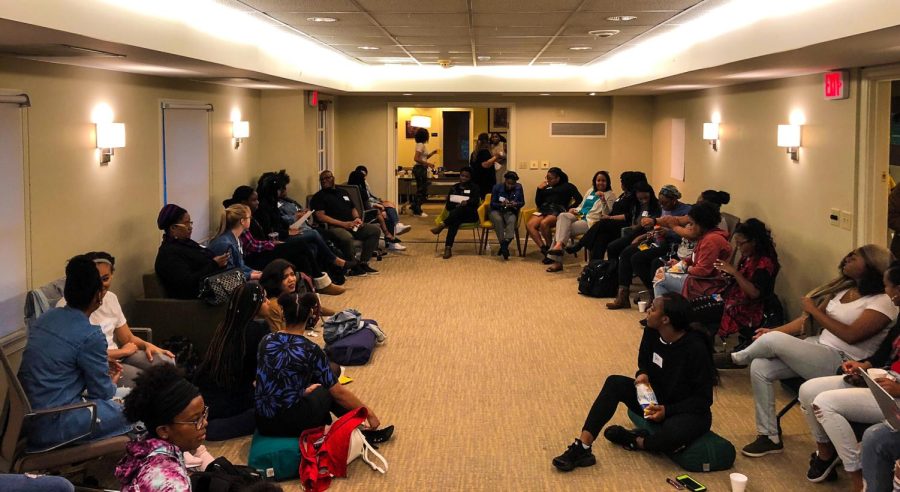‘Where Do Black Women Go to Cry?’ sheds light on mental health awareness
Women gather as “Where Do Black Women Go to Cry” educates undergrads, grads and faculty on mental health awareness in the black community.
February 21, 2018
The Williamson House overflowed with a majority of women faculty and students as they all gathered around to ask one question: Where do black women go to cry?
“This event is important because… there are so few of us, and the few that we do see, you either kind of know them for what you see them as on campus, or, who they portrayed themselves as, versus really getting a chance to understand them,” said junior fashion merchandising major Aceani Ross-Bigbee.
Senior journalism major Ile-Ife Okantah, approached the panel differently from the others, opting not to read the preplanned questions until right before.
“I didn’t really do much to prepare,” Okantah said. “I wanted this to be as vulnerable and organic as possible, so I didn’t even really read the questions until maybe about five minutes before, but I wanted to not feel prepped or PR-y.”
Okantah and Ross-Bigbee agreed that the event was important to take place at a predominantly white college such as Kent State.
“There has to be areas where we feel like we can be ourselves and it’s not forced,” Okantah said. “A lot of the times I feel as if some diversity events are kind of forced and some diversity events are kind of just like, ‘let’s do this because black people are here.’ I like it when it’s more natural and it’s just like this is an area we can be ourselves.”
Michelle agreed, saying that those spaces give people the opportunity to open up.
“It kind of gives us a space to be like, OK, I can maybe do this or I feel confident in this and gives us the strength to open up about it,” Ross-Bigbee said.
“Where Do Black Women Go to Cry?” kick-started the trilogy of events slated to happen later on this semester. The other two events are “Where Do Black Women Go to Reclaim Their Bodies?” and “Where Do Black Women Go to Be Awkward?”
Summer Wigley, a graduate higher administration and student personnel major as well as an assistant at the Women’s Center came up with the idea for the event.
“I was tasked with developing health initiatives, so one of the things … that we’re trying to go as a women’s center is more focusing on that health as well because that’s important to women’s issues overall,” Wigley said.
Wigley credited the event to a past conversation she had with her friend, Shan’Ternera, who raised the question of “Where do black girls go to cry?”
“So I asked her permission, could I ask this larger question of where do black women go,” Wigley said.
Wigley agreed about the importance of the conversation, especially at Kent State. She referenced the black women’s retention rates that came out last semester.
“What was it that wasn’t successful for them to keep pursuing their experiences at Kent?” she said. “Overall, when we look at our university’s climate study, we know that sense of belonging was one of the biggest ones that needed a whole lot of improvement and needed to be addressed quickly, but also appropriately.”
She said the Women’s Center knew that it needed to become involved, and so research was conducted to see how it could better serve the communities.
“There was a responsibility there to start having conversations about more identities of women. You know, historically women’s centers have, when you think women’s center, like you think white women. So, what are we committed to doing to include other identities?” Wigley said.
Alicia Robinson, the assistant director of the Women’s Center, said there are ties leading back to slavery and the civil rights movement, that show that black women aren’t allowed to be sensitive.
“It’s kinda like — we’re not allowed to cry,” Robinson said. “Like, you know, you need to be strong, you need to be resilient, you need to bounce back… It’s just kind of … become like our norm.”
Robinson said that it is changing, especially in the younger generations who are more open to these topics.
“We are being raised in a time where, you know, we’re different than our parents and our grandparents,” Robinson said. “I do think it’s starting to be more accepted in certain pockets. I feel like the fact that we’re even on a college campus puts us in a seat of privilege,” Robinson said.
Michelle drove home the importance of knowing that everyone goes through their own experiences and they’re not alone.
“People need to look at (the) other people that they look up to and see that they are human and they’re not just these perfect individuals who have it all together and who are able to inspire rooms and groups of people, but they also are going through different things on their own,” Ross-Bigbee said.
Madison MacArthur is the diversity reporter. Contact her at [email protected].

























